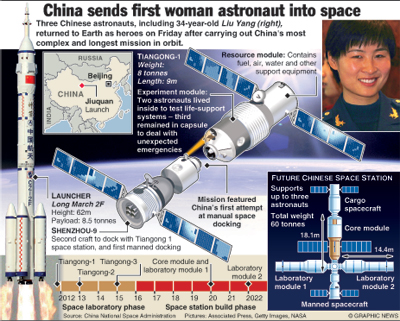Sunday Times 2
Shenzhou-9: China’s new age of discovery and self-discovery
Hong Kong (CNN) — With the Shenzhou-9 touching down in China Friday, expect the inevitable wave of propaganda touting its “model” citizens and scientific might.And what a mighty week it has been. China has witnessed the return of a manned spacecraft that successfully docked with the Tiangong 1 space lab — a first for the nation.
 Chinese astronauts Jing Haipeng (C), Liu Wang (L) and Liu Yang, China's first female astronaut, salute in front of the re-entry capsule of China's Shenzhou 9 spacecraft in Siziwang Banner, Inner Mongolia Autonomous Region June 29, 2012. China's Shenzhou 9 spacecraft returned to Earth on Friday, ending a mission that put the country's first woman in space and completed a manned docking test critical to its goal of building a space station by 2020. REUTERS
|
 |
China is also still on a high after the deep-sea diving record set on Sunday by a Chinese manned submersible in the Pacific Ocean’s Mariana Trench.
And while China’s achievements in sea and space are impressive, do they stir more than just national pride? The Shenzhou-9 may be a stellar status symbol for Beijing but is it awakening a real hunger for adventure among the Chinese people?
According to Chinese explorer Wong How Man, the answer is an emphatic yes. “We’re in space… not just making cellphones,” he told CNN.
As the President of the China Exploration and Research Society, Wong has been leading expeditions in China since he founded the group in 1986. In June 2005, he discovered the new source of the mighty Yangtze River.The veteran explorer said China’s landmark journeys in recent years have shored up not only national pride but an individual desire to venture forth.
“On a grassroots level, there’s this huge urge to explore our own vast country,” he said.Yunnan native Mei Zhang has seen that curiosity first-hand as the founder of WildChina, a Beijing-based company that offers off-the-beaten-track travel experiences.
She claimed a spirit of adventure is very much alive, as traditional values that may have limited exploration take a backseat.
Zhang cited one traditional Chinese saying in particular: “Fu mu zai, bu yuan xing,” or — roughly translated — “When your parents are around, don’t travel far away.”
“The first virtue was to be “xiao,” or filial to your parents,” said Zhang. “And that held back a lot of people and they stayed home. But with the internet, young people now see the world and say, ‘Wow… why can’t I do that?’”She pointed to Chinese polar explorer Yuan Xiao as the ultimate “unfilial” son.
Shanghai born and bred, Xiao left a 10-year career in banking to explore the world. He’s one of the first Chinese to have navigated both the North and South Poles — where he went to climb, ski and even scuba dive.And yet, “China’s bravest adventurer” pointed out that he’s not that unique. “Zheng He, Zhang Qian, and the monk in Journey to the West… the Chinese have always been adventurous for different reasons,” he said. “The spirit has always been there.”
And that spirit has been revived again with the return of the Shenzhou-9. China is embarking on a new age of discovery… and self-discovery, as more of its citizens consider an adventure far, far away from home.
Courtesy CNN
comments powered by Disqus


















